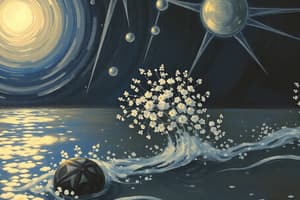Podcast
Questions and Answers
What is a key difference between scientific laws and theories?
What is a key difference between scientific laws and theories?
- Laws are flexible concepts, while theories are rigid frameworks.
- Laws are based on past observations, whereas theories are predictions.
- Laws describe relationships in nature, while theories explain phenomena. (correct)
- Laws require experimental proof, while theories are universally accepted.
How are scientific laws typically expressed?
How are scientific laws typically expressed?
- Via qualitative descriptions that vary by observation.
- In graphical representations to illustrate trends.
- Through mathematical equations that quantify relationships. (correct)
- In narrative form to describe scenarios.
What role does science play in addressing societal challenges?
What role does science play in addressing societal challenges?
- It helps in technological advancements that enhance our lives. (correct)
- It offers purely theoretical viewpoints that lack direct application.
- It focuses solely on historical events without addressing current issues.
- It provides philosophical arguments without practical implications.
What do scientific theories primarily provide?
What do scientific theories primarily provide?
How does understanding scientific principles benefit decision-making?
How does understanding scientific principles benefit decision-making?
Which branch of science is primarily concerned with studying living organisms?
Which branch of science is primarily concerned with studying living organisms?
What is the first step in the scientific method?
What is the first step in the scientific method?
Which type of reasoning involves deriving specific conclusions from general premises?
Which type of reasoning involves deriving specific conclusions from general premises?
What role does ethical consideration play in scientific research?
What role does ethical consideration play in scientific research?
How does the scientific method allow for changes in research?
How does the scientific method allow for changes in research?
In what way does scientific communication contribute to the scientific community?
In what way does scientific communication contribute to the scientific community?
Which of the following is NOT a key step in the scientific method?
Which of the following is NOT a key step in the scientific method?
What is a primary focus of formal sciences?
What is a primary focus of formal sciences?
Flashcards
Scientific Law
Scientific Law
A fundamental relationship or pattern in nature that is often expressed in mathematical terms and applies universally.
Scientific Theory
Scientific Theory
A well-substantiated explanation for a natural phenomenon based on observations and experimental results.
Importance of Science
Importance of Science
Science helps us understand the world, solve problems, and make informed decisions about our planet, health, and technology.
Law vs. Theory
Law vs. Theory
Signup and view all the flashcards
Scientific Progress
Scientific Progress
Signup and view all the flashcards
Life sciences
Life sciences
Signup and view all the flashcards
Formal sciences
Formal sciences
Signup and view all the flashcards
Scientific method
Scientific method
Signup and view all the flashcards
Inductive reasoning
Inductive reasoning
Signup and view all the flashcards
Deductive reasoning
Deductive reasoning
Signup and view all the flashcards
Scientific communication
Scientific communication
Signup and view all the flashcards
Ethics in science
Ethics in science
Signup and view all the flashcards
What is science?
What is science?
Signup and view all the flashcards
Study Notes
Branches of Science
- Science is a systematic approach to understanding the universe through testable explanations and predictions.
- It encompasses two main categories: natural sciences (studying natural phenomena) and formal sciences (studying abstract concepts).
- Natural sciences are further divided into physical sciences (non-living matter and energy) and life sciences (living organisms and interactions).
- Physical sciences include physics, chemistry, and astronomy.
- Life sciences include biology, ecology, and genetics.
Scientific Method
- The scientific method provides a structured process for scientific investigation.
- Steps involved are observation, question formation, hypothesis (possible explanation), prediction (if-then statement), experiment (testing), analysis (examining results), and conclusion.
- The method is iterative; adjustments can be made based on new data and observations.
Scientific Reasoning
- Deductive reasoning draws specific conclusions from general principles.
- Inductive reasoning derives general conclusions from specific observations.
- Abductive reasoning proposes explanations for observed phenomena.
- Critical thinking is essential to assess scientific claims and evidence.
Scientific Communication
- Sharing scientific knowledge is vital for progress.
- Communication occurs through peer-reviewed publications, conferences, and presentations.
- This allows for scrutiny, feedback, and collaboration.
- Open access to scientific information fosters broader understanding and diverse perspectives.
Ethics in Science
- Ethical considerations are crucial in scientific research.
- Key ethical guidelines include honesty and integrity in data handling, respect for participants (especially humans and animals), avoidance of plagiarism, and transparent research practices.
Scientific Laws and Theories
- Scientific laws describe fundamental patterns in nature, often expressed mathematically.
- Scientific theories explain phenomena based on well-supported evidence.
- Theories encompass a wide range of observations and experimental outcomes.
Importance of Science
- Science addresses societal challenges and expands human knowledge.
- It drives technological advancements that enhance our lives.
- Scientific principles inform decisions about environmental issues, health, and sustainability.
- Scientific progress deepens our understanding of the universe and our place within it.
Studying That Suits You
Use AI to generate personalized quizzes and flashcards to suit your learning preferences.




